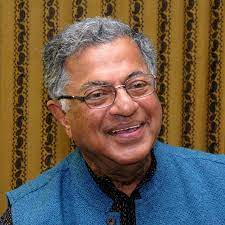
Girish Karnad is an Indian playwright, author, actor, and film director whose movies and plays, written largely in Kannada. • He wrote his first play, the critically acclaimed Yayati (1961), while still at Oxford. Centred on the story of a mythological king. • Karnad’s next play, Tughlaq (1964), tells the story of the 14th- century Sultan Muhammad ibn Tughluq and remains among the best known of his works.
Karnad is internationally known as a playwright, but is also a highly talented film-maker, a versatile actor, an able cultural administrator, a noted communicator and a person of wide accomplishments and interests. • Based on his serious explorations of folklore, mythology and history, the subject of his plays reflect the problems and challenges of contemporary life, and endeavour to forge a link between the past and the present.
• Karnad has left an indelible impact on the history of contemporary Indian dramaturgy.
• He was rooted in the cultural tradition of his soil with a deep understanding of Western dramatic aesthetics and craft.
Tughlaq’ is Karnad’s second play written in 1964; the play was originally written in Kannada and then translated in English by Karnad himself.
• It is all about the life of Sultan Muhammad bin Tughlaq who has ruled in India in 14th century.
• There is a lot of controversy among the historians about the character of Tughlaq but Karnad has presented this man as a man of opposites. about the character of Tughlaq but Karnad has presented this man as a man of opposites.
• The central theme of the play is the complexity in the character of Sultan Tughlaq, who has both the elements good as well as evil.
• He is a visionary man as well as man of action. Other characters also present Tughlaq’s dual personality; his close associates Barani and the scholarly historian Najib are practical politician like him.
From the very first scene we come to know about the complex personality of Tughlaq.
• He is one of the most fascinating kings to occupy the throne in Delhi. He ruled for 26 years, a period of unparalleled cruelty and agonising existence for his subjects.
• He can be considered as a learnt and an intelligent man. He has abilities abilities to learn with curiosity curiosity to know and he is a master in playing chess.
• He has the knowledge of ‘Quran’ more than any sheikh, and also a good reader who has read Greek, farcical and Arabic literature.
• Tughlaq wanted his life as a garden of roses, where even thrones also give delight; his imagination expresses his sense about literature.
He understood the value of money as not deriving from its intrinsic worth but from the promise behind it: and introduced copper coins.
• Yet in 20 years his reign had degenerated into an anarchy and his kingdom had become a "kitchen of death".
• He wanted to make a new India, and for him it was very difficult but he is ready to explain what people don’t understand.
• Tughlaq changed the capital from Delhi to Daultabad, and from there again to Delhi.


No comments:
Post a Comment